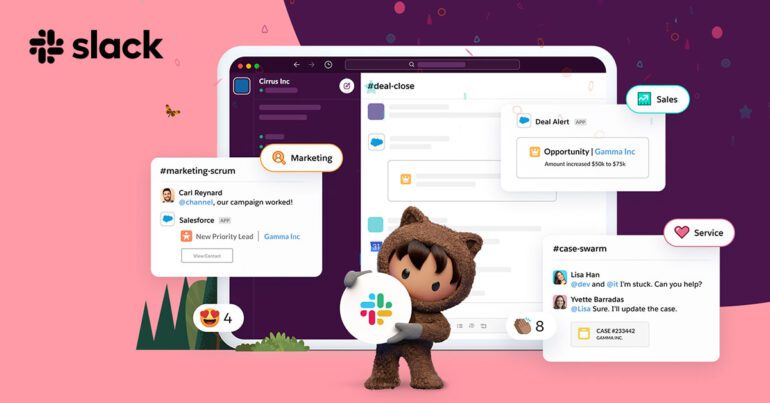TL;DR:
- Slack, under Salesforce, plans to rehire former staff to strengthen its generative AI capabilities.
- The company aims to hire a significant number of new roles focused on product development engineering and generative AI.
- Slack intends to leverage the skills of former employees to advance its work in the field.
- This decision follows Salesforce’s recent layoffs and signifies Slack’s commitment to fueling innovation.
- Salesforce is ramping up its AI efforts with tools like Einstein GPT and various other “GPTs” for different business functions.
Main AI News:
In a surprising turn of events, Slack, the messaging subsidiary of Salesforce, is looking to reinvigorate its workforce by rehiring former employees. This strategic decision comes less than six months after Salesforce implemented widespread layoffs, which affected approximately 8,000 employees. The move signifies Slack’s unwavering commitment to fuel its generative AI ambitions and enhance its product development engineer (PDE) team.
According to a memo obtained by Fortune, Slack CEO Lidiane Jones expressed the company’s intention to hire a “significant number of new roles” in the upcoming quarter. These positions will primarily focus on driving advancements in generative AI technology, as well as improving Slack’s existing features, such as Huddles and Lists. Jones further emphasized the company’s eagerness to welcome back former Slack employees who possess the requisite skill sets to contribute to these endeavors. The objective is to leverage their expertise and collaborate effectively to achieve remarkable results in the fiscal year 2024.
The specific number of Slack employees affected by Salesforce’s earlier layoffs remains undisclosed. However, Slack’s decision to potentially rehire some of the previously laid-off staff echoes a recurring trend in the tech industry. Amid economic uncertainties and cost-cutting measures, companies like Twitter have undertaken staffing U-turns, seeking to re-employ certain individuals shortly after downsizing. Slack’s spokesperson reiterated their commitment to attracting outstanding talents, regardless of whether they are new recruits or returning professionals who have previously contributed to the company’s success.
The timing of this rehiring initiative coincides with Salesforce’s intensified focus on artificial intelligence. During a recent earnings call, CEO Marc Benioff shared his vision for the company’s ambitious AI endeavors, drawing inspiration from his conversation with OpenAI founder Sam Altman. Benioff outlined an upcoming AI “supercycle” and urged CEOs to make aggressive investments in AI technologies to maintain competitiveness. In line with this vision, Salesforce unveiled Einstein GPT, a generative AI tool aimed at boosting efficiency in sales, marketing, and customer service operations.
Notably, Salesforce’s commitment to AI innovation extends beyond Einstein GPT. The company has an ongoing development roadmap for various other “GPTs,” including Sales GPT, Service GPT, Marketing GPT, Commerce GPT, Slack GPT, and Tableau GPT. This comprehensive approach highlights Salesforce’s dedication to harnessing the full potential of AI across diverse business functions.
With its latest rehiring strategy and Salesforce’s A.I.-focused trajectory, Slack is poised to regain its footing in the industry. Salesforce’s resilience in overcoming recent challenges, including the proxy fight with activist investors and subsequent cost-cutting measures, indicates a renewed sense of purpose and determination. Slack’s decision to rehire former employees, in particular, showcases the company’s belief in nurturing existing talent while embracing new avenues of growth.
Conclusion:
Slack’s strategic move to rehire former employees reflects its determination to push the boundaries of generative AI innovation. By focusing on product development engineering and bringing back skilled individuals, Slack aims to enhance its offerings, such as Huddles and Lists. This decision aligns with Salesforce’s broader AI strategy, as evidenced by the introduction of Einstein GPT and the development of multiple “GPTs” across various departments. The market can anticipate increased competition and accelerated advancements in A.I.-driven solutions as Slack leverages its workforce’s expertise to stay at the forefront of the industry.

